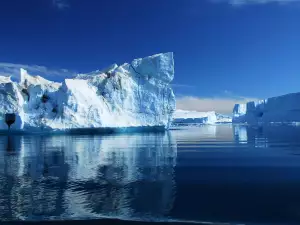Canadian geologists have come upon a spring located on the northern Ellesmere Island that does not freeze over even at temperatures of -60°F (-50 °C), which fall during the night.
The scientists have called the phenomenal spring Ice River. The northern spring never freezes, with the water cascading down a mountainside 984 ft (300 m) high year-round.
The study by the Canadian researchers is published in Geology magazine.
The spring on Ellesmere Island was found in a forested area, and the water flows down a slope of 21°.
The spring does not freeze over even during winter, when it is polar night and temperatures fall below -60°F (-50 °C).
The water in the Ice River spring is abundant and reaches 137 gal (520 L), while managing to retain a warmth of 50°F (9 °C) despite the Arctic chill.
An extensive geochemical analysis has shown a surface origin of the water. First it descends from the surface to a depth of 1.8 miles (3 km), then returns back to the surface in the form of running water, piercing the dense layer of eternal ice.
According to the scientists' suppositions, it is possible for the geohydrological processes in some polar regions to occur slower, thus leading to such anomalies.
Steven Grassby and his colleagues from the scientific communities have a different hypothesis for the natural anomaly. According to them, the active erosion processes have granted the spring specific attributes.

The scientists remind that such springs have been found on Mars, and it has been suggested that in the past, the water on the Red Planet had sprung from confined aquifers.
Last year, a similar find was made in a glacier in Alaska. The remains of an ancient forest were found in the northern state, with it having preserved trees that were 2350 years old.
The ancient trees were uncovered on the glacier Mendenhall in the valley of the same name, near the Juneau glacier.
Scrutiny by the experts has shown that underneath the thick snow layer of the glacier, the trees are well protected and it is fully possible for the glacier to be concealing an even more ancient forest.









